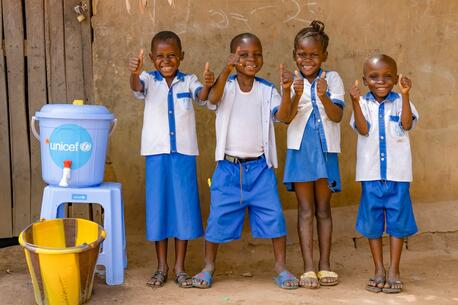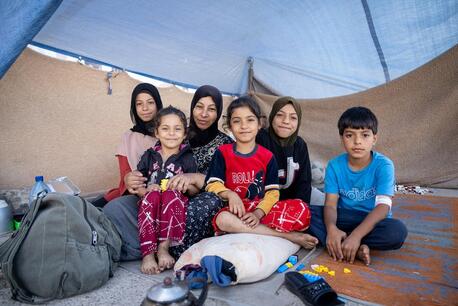
Young Athletes Take an Active Approach to COVID-19 in Montenegro
With the support of UNICEF, the Ministry of Education and the Ministry of Sports and Youth, the Special Olympics adapts its Young Athletes program for home.
"Thank you for thinking of us …. The whole family is thrilled and we cannot wait to start training."
This was the reaction of Sanja Šćekić, mother of 8-year-old Tara, from Podgorica, Montenegro, when a package from the Young Athletes at Home program arrived at her family's home. Inside was all the sports and recreation equipment that Šćekić needed to recreate the training and fitness regimen that her daughter would normally follow as a member of Special Olympics' Young Athletes program.
Special Olympics International runs Young Athletes programs in more than 130 countries worldwide to provide opportunities for children with or without intellectual disabilities to improve their motor, cognitive and socio-emotional skills. According to Special Olympics' findings, these programs achieve meaningful results.

Special Olympics International has accredited Young Athletes programs in more than 130 countries around the world to provide opportunities for children aged 2 – 8 with or without intellectual disabilities to improve their motor, cognitive and socio-emotional skills.
"As a result of the Young Athletes program, an improvement of over 30 percent has been noted in children’s motor, cognitive and socio-emotional skills," says Ivan Radović, director of the Special Olympics in Montenegro.
COVID-19 restrictions make regular exercise more important — and harder to get — than ever
But with many of the venues that host Montenegro's Young Athletes program closed due to COVID-19 and kindergarten suspensions confining children to their homes, those gains could easily be lost. To ensure children's continued progress, Special Olympics, UNICEF and Montenegro's Ministry of Education and Ministry of Sports and Youth teamed up to adapt the program for families' use at home.
The first program of its kind, Young Athletes at Home sends families a box of sports equipment plus printed educational material supplied by the Special Olympics. Accompanying instructional videos are posted on partners’ social media channels tagged #YoungAthletesAtHome and #PlayAtHome, the hashtag for another UNICEF-supported campaign lead by Montenegro’s kindergartens, which are sharing various games parents and children with and without disabilities can play during the COVID-19 pandemic. In all, there are 48 Young Athletes at Home 30-minute exercise videos, enough to give children and parents three new installments each week over four months.
“We were the first in Europe to launch the Young Athletes at Home program, and we hope that other national Special Olympics programs in the Europe/Eurasia region will follow our example,” says Radović.
Empowering parents like Šćekić to stand in for their children’s Special Olympics coaches is a unique solution to one of families’ most significant challenges during these unprecedented times.
With all children spending much of their time at home during the school closures, regular exercise is more important than ever. But restrictions can also make it harder than ever to get, especially for children with disabilities.
Crises such as the COVID-19 pandemic do not affect all children equally. Children who were vulnerable before are even more vulnerable now. That is why UNICEF’s priority is to provide support to the most vulnerable. — Michaela Bauer, acting head of the UNICEF Office in Montenegro
“Crises such as the global COVID-19 pandemic do not affect all children equally. Unfortunately, children who were vulnerable before the crisis are even more vulnerable now,” says Michaela Bauer, acting head of the UNICEF Office in Montenegro. "That is why UNICEF’s priority is to provide support to the most vulnerable, and among these are certainly families with children with disabilities."

The Special Olympics provides the necessary sports equipment and educational materials to parents of children with disabilities so that they can continue to take part in the sports and recreational activities of the Young Athletes program at home.
UNICEF knows that the greater burden children living with disabilities face necessitates greater effort
UNICEF knows that the greater burden children living with disabilities face necessitates greater effort to address the obstacles and stressors the pandemic has imposed.
The COVID-19 lockdowns and restrictions have limited some parents’ ability to take their children for the regular treatment — physiotherapy, somatopedics, physiatry — they require. Curtailed opportunities to participate in physical activities, socialize and engage with others could also exacerbate the isolation and challenges children with disabilities already experience. The Young Athletes at Home program tackles all these issues.
“The exercises offered to parents for them to practice at home have a positive effect on the child’s general state of health, emotional state and behavior,” says Tamara Milić, of Montenegro's Ministry of Education. “However, what is even more important is that this will strengthen the child’s self-confidence and emotional connection with their parents, brothers and sisters.”
All photos by Duško Miljanić for UNICEF Montenegro
HOW TO HELP
There are many ways to make a difference
War, famine, poverty, natural disasters — threats to the world's children keep coming. But UNICEF won't stop working to keep children healthy and safe.
UNICEF works in over 190 countries and territories — more places than any other children's organization. UNICEF has the world's largest humanitarian warehouse and, when disaster strikes, can get supplies almost anywhere within 72 hours. Constantly innovating, always advocating for a better world for children, UNICEF works to ensure that every child can grow up healthy, educated, protected and respected.
Would you like to help give all children the opportunity to reach their full potential? There are many ways to get involved.





